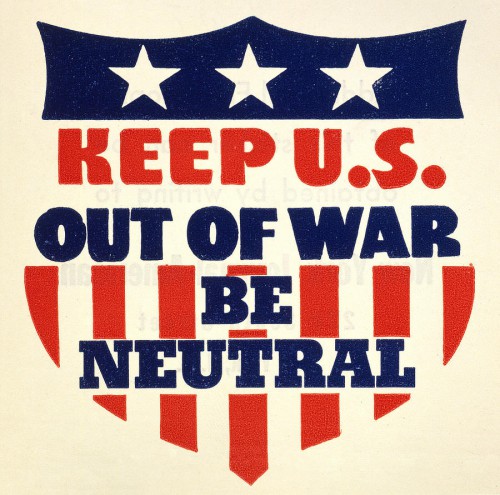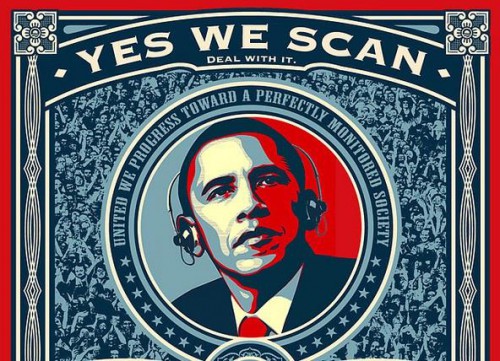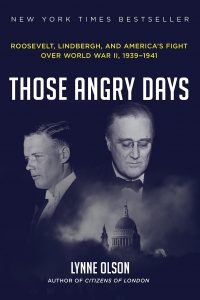 Lynne Olson
Lynne Olson
Those Angry Days: Roosevelt, Lindbergh, and America’s Fight over World War II, 1939–1941
New York: Random House, 2013
The idea of America First policy is back after a long hiatus. The first proponent for such a policy was none other than George Washington. He endorsed the idea in his farewell address [2], stating:
The nation which indulges towards another a habitual hatred or a habitual fondness is in some degree a slave . . . which is sufficient to lead it astray from its duty and its interest. Antipathy in one nation against another disposes each more readily to offer insult and injury, to lay hold of slight causes of umbrage…when accidental or trifling occasions of dispute occur. Hence, frequent collisions, obstinate, envenomed, and bloody contests.”
The president who took an opposing view [3] was John F. Kennedy:
“Let every nation know, whether it wishes us well or ill, that we shall pay any price, bear any burden, meet any hardship, support any friend, oppose any foe to assure the survival and the success of liberty.” (My emphasis.)
How the standard wisdom went from Washington’s concern for entangling foreign alliances to Kennedy’s declaration that he’ll bet the farm on the liberty of an ally occurred in the years between 1939 and 1941. The great issue was whether or not the United States should become involved in World War II.
How that debate occurred is documented by Lynne Olson’s [4] book Those Angry Days: Roosevelt, Lindbergh, and America’s Fight over World War II, 1939–1941. The book is highly illuminating. The controversy was hot and heavy from the start of World War II in 1939 until the attack on Pearl Harbor. The quarrel split families, caused fistfights in Congress, and led to deplatforming and other forms of nastiness. When reading about the conflict, there is a raw sense of current events to it also.

For example, how far does America go to protect an ally? If an ally is spying on one’s citizens, are they really an ally? Are “dictators” an automatic evil or are they a rational response to a nation’s foreign and domestic threats? How big should the military be in a time of peace? Are Jews full citizens or a separate people pursuing their own interests?
To Fight or Not to Fight
The two men that personified the struggle are Charles A. Lindbergh and Franklin Delano Roosevelt. Lindbergh, the first man to cross the Atlantic solo in an airplane, believed the United States should keep out of the war in Europe. Roosevelt was the chief interventionist. Or, more accurately, Roosevelt’s passionate supporters caused him to be an interventionist.
Lindbergh’s and Roosevelt’s mutual dislike went back to a controversy in 1934. Roosevelt wanted to end any appearance of impropriety involving airmail contracts to private aviation firms by using Army Air Corps aircraft to deliver the mail. Lindbergh argued that the Army’s aircraft were not suited to the role for technical reasons. After several crashes, Roosevelt went back to contracted aircraft. Lindbergh won his first round against the President.
In September 1939, the antipathy between the two men intensified when the British declared war on Germany for invading Poland. Lindbergh and the isolationists felt that the United States should stay out of the war. They were motivated by the unsavory end to the First World War.

In brief, the United States had lent money to various Allied powers. Thus Americans were drawn into the conflict to protect their investments, then weren’t paid back anyway. World War I killed 500 Americans per day during the Meuse-Argonne Offensive, so the price for involvement was steep. The British also loaded armaments on passenger ships and flew the US Flag on these ships to deceive German U-Boats. When those passenger ships were sunk, Americans understood they were being manipulated by the British. Additionally, British propaganda about “The Hun” had been proven false before the 1920s were finished. Furthermore, there was a sense that the British were not an innocent party in the war — they were an imperialist power.
Shortly after the start of hostilities, Lindbergh argued for [5] an American policy along the following lines:
- An embargo on offensive weapons and munitions.
- The unrestricted sale of purely defensive armaments.
- The prohibition of American shipping from the belligerent countries of Europe and their danger zones.
- The refusal of credit to belligerent nations or their agents.
He further argued that the United States had an important racial connection to all of Europe that should not be forgotten in a time of increasing Japanese belligerence and other problems with non-whites.
Since Lindbergh was already a national hero, people took notice.
Meanwhile, there was a highly active pro-intervention group consisting of different factions with different backgrounds and motivations. Olson mentions Jewish pressure in Hollywood, but she doesn’t say much about Jewish influence in the Roosevelt administration. Olson also mentions “anti-Semites,” but puts them in the category of kooks rather than the serious thinkers that they were. Of that, Wilmot Robertson says,
Instead of submitting anti-Semitism to the free play of ideas, instead of making it a topic for debate in which all can join, Jews and their liberal supporters have managed to organize an inquisition in which all acts, writings, and even thoughts critical of Jewry are treated as a threat to the moral order of mankind. The pro-Semite has consequently made himself the mirror image of the anti-Semite . . . the Jewish intellectual who believes passionately in the rights of free speech and peaceful assembly for all, but rejoices when permits are refused for anti-Semitic meetings and rocks crack against the skulls of anti-Semitic speakers. [1] [6]
In addition to the organized Jewish community, several other groups supported American involvement in the conflict. Some were American Anglophiles who were prominent in New England. There was also a sub-set of men who can be called the Plattsburg graduates.

The Plattsburg graduates were upper-class Americans who had attended military training in Plattsburg, New York in 1915. These men went on to become officers during the First World War. They were not isolationists so much as men wishing the nation be prepared for conflict should it come. Although they had some training, many of their enlisted soldiers were rushed into battle with only two days’ training. Since they were prominent men as well as veterans, people took notice of their ideas. They pushed for enlarging the armed forces in 1940.
A First Look at the Isolationists’ Problems
The isolationists’ main problem was that the German point of view was never well-received by Americans. The fact that Hitler was greeted with flowers in Austria, the Sudetenland, and other parts of German-speaking Europe just didn’t register. Instead, the public felt that Nazi Germany was an enormous threat. The German American Bund, a pro-Nazi group based in New York City, were painted as “fifth columnists” in the media. German books and publications that stated their case didn’t sell.
Fascist optics have never worked in America.
Interventionist Dirty Tricks and Metapolitics
The pro-interventionist faction had two things going for them: dirty tricks and great metapolitics. The British government focused on intelligence gathering on isolationists, German diplomats in the US, and German sympathizers. This included wiretapping as well as infiltration of spies by the British, the FBI, and private groups like the Jewish Anti-Defamation League (ADL). The ADL didn’t use Jews as spies; they found whites to do the job.
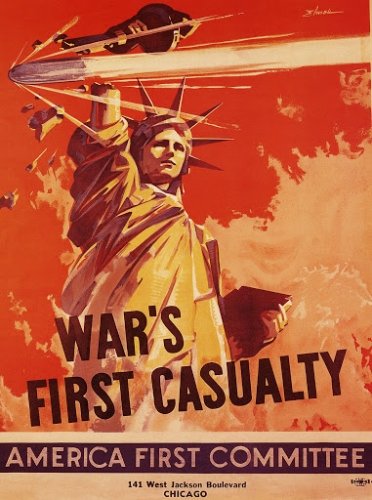
Other than a few exceptions, most isolationists had no connection to any foreign government and they weren’t able to draw upon organizational resources or any government to do the same to their enemies.
The dirty tricks weren’t as important as metapolitics:
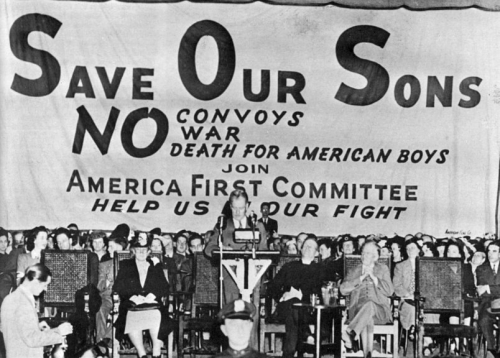
One of the best metapolitical leaders for intervention was Robert E. Sherwin [9], a playwright who came to believe that America should enter the war. Many of his plays were made into influential pro-intervention movies. Some of the outstanding movies based on Sherwin’s work were:
- Waterloo Bridge [10] (1940): This is a fallen woman/romance story that made the British look cool.
- Abe Lincoln in Illinois [11] (1940): “The implied comparison of America’s dilemma in the 1850s to that in the late 1930s was clearly understood by the play’s audiences. Heywood Broun of the New York World called Abe Lincoln in Illinois “the finest piece of propaganda ever to come into our theater. . . . To the satisfied and the smug, it will seem subversive to its very core. And they will be right. . . . It is the very battle cry of freedom.” [2] [12]
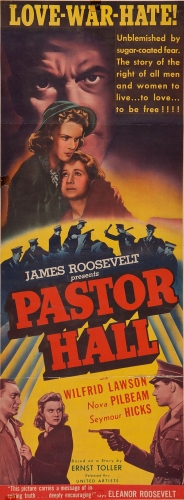 Other pro-intervention movies were:
Other pro-intervention movies were:
- Pastor Hall [13](1940): This film tells the story of a Christian minister put in a Nazi prison camp. It is probably more fiction than fact.
- That Hamilton Woman [14] (1941): Starring Vivian Leigh, it compares Hitler to Napoleon and endorses war against dictators.
- Mrs. Miniver [15] (1942): This film follows the life of a happy upper-middle-class English family that participates in the Dunkirk evacuation and the following Battle of Britain. It is the best of the pro-war films of the early 1940s.
No Hollywood movies were portraying the Communists in Europe during the 1920s and 30s in a poor light. There was nothing about Germans stranded in dysfunctional new Eastern European nations following the collapse of the Austro-Hungarian Empire. There was nothing about Bela Kun, Soviet atrocities, or Gulags. The pro-intervention movies were “propaganda with a very thick coating of sugar.” [3] [16]
An Incident Was Inevitable . . .
By late 1941, the Battle of Britain was over, but the Roosevelt administration had drafted many young men into the armed forces where they trained with wooden rifles or trucks labeled “tank.” Morale was low, and the economy had not shifted to producing war equipment. Meanwhile, Roosevelt also adopted the Lend-Lease Policy. This allowed the British to get American aid, and it effectively made America a British ally, albeit a non-belligerent one.
By this point, Lindbergh felt that war was inevitable. It was only a matter of time before some incident would draw the United States into the fray. On September 11, 1941, Lindbergh decided to deliver a speech [17] explaining which factions had pushed America into a corner. He identified the three factions as the British, the Roosevelt administration, and the Jews. The Des Moines speech was entirely true, and it led to an explosion in the national conversation. Any criticism of Jewish interests carries the charge of anti-Semitism. [4] [18] Olson argues that the speech caused the American public to focus on Jewish issues rather than avoiding entry into the conflict.
The incidents were already on the way, though, so it hardly mattered. The US Navy was escorting merchant ships to Britain as far as Iceland, and the USS Greer had already fired shots at a German U-Boat.
Between September and December 1941, the isolationists retained a solid grip on the public mind and confined pro-war activists a great deal. Wrinkles from the USS Greer incident could be smoothed over. Then isolationist newspaper, the Chicago Tribune, owned by the isolationist Robert R. McCormick, published a leaked War Department plan to fight Germany. Ironically, the plan was created by a pro-German American army officer, Albert Coady Wedemeyer, and it was used when war came. The leak was probably made by US Army Air Forces General “Hap” Arnold.

Then came Pearl Harbor.
In the wake of the devastation in Hawaii, the isolationists admitted that the United States had to go to war — with Japan. And the President agreed with them. The US only declared war on Japan. It was Hitler who declared war on the United States following the attack. Had that not occurred, it is highly likely that America would have cut aid to England and Russia and focused on the Pacific. The conflict in Europe would have played out far differently.
Charles Lindbergh spent the war as an industry consultant. He ceased criticism of Roosevelt and became a test pilot and aircraft developer. The pro-German Wedemeyer helped the invasion of Normandy and became a general officer. Other prominent America First activists joined the war effort and did heroic service. One of them, Gerald Ford, eventually became president. Another isolationist who became president was John Kennedy. Indeed nearly all the isolationists turned out to be heroes later, but most had to “disavow,” to a degree, their previous activism.
The far-Right of the isolationists, William Dudley Pelley and Laura Ingalls [19] (the aviator, not the girl from Little House on the Prairie) (photo) were sent to jail for a time under trumped-up charges.
 America First and isolationism still matter. Indeed, the isolationists were not proved wrong. They could claim that they had kept America neutral until it was attacked by a treacherous foe. They did, however, make mistakes that can be discussed in retrospect.
America First and isolationism still matter. Indeed, the isolationists were not proved wrong. They could claim that they had kept America neutral until it was attacked by a treacherous foe. They did, however, make mistakes that can be discussed in retrospect.
Isolationist Failings
The Second World War was not caused by Hitler, it was caused by the reaction to his rise to power. Hitler was greeted with the same hysteria by the same sorts of people that got hysterical over Trump. Hitler’s movement could have been tempered by the ordinary workings of the representative government, but an Antifa mattoid burned down the Reichstag, allowing Hitler to assume emergency powers.
Additionally, the British drew the red line against Hitler in the wrong place. It should have been drawn between Germany and France and Germany and the Low Countries. Instead, it was drawn at Poland. Once the British and French drew the line in Poland, it was only a matter of time before the United States was involved due to the many ties between the two nations. In the end, isolationism came apart when the Japanese attacked Pearl Harbor.
There was also never creative output on the part of the isolationists that matched the pro-war effort. Anne Lindbergh’s book that supported America First ideas, The Wave of the Future, was difficult to understand. Futurist books are always iffy. In addition to good movies, the interventionists had Dr. Seuss as a cartoonist who portrayed isolationists as ostriches with their heads in the sand. There were also many pro-intervention newspaper editors and reporters.
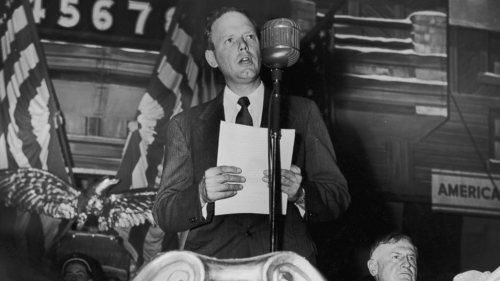
America’s Yankee elite was terribly divided. Yankees from the Mid-West tended to support isolationism. Those in New England wanted preparedness, if not outright interventionism. Meanwhile, the hostile organized Jewish community was united in pushing for war. Therefore, criticism of Jews as war agitators could be balanced by many examples of blue-blooded Northeastern WASPs who were members of Jew-free country clubs that supported interventionism.
Epilogue
The isolationists did shape policy to such a degree that the British paid a dear price for World War II. To get the Lend-Lease Act passed, Roosevelt pressured the British government to sell large British holdings in the United States. [5] [20] This action was repeated enough times that by the end of the conflict, Britain had debts and no assets to generate income to pay the debts. Additionally, the Labour Party made several poor economic decisions after they came to power at the end of the war. The British were the richest and most powerful people in the world in 1914. By the winter of 1946, the British were on food rations and they were suffering a coal shortage.
The isolationists were also not wrong about Jewish and Communist influence on American policy. In the aftermath of World War II, the political Right in Hollywood organized a blacklist and removed the worst of the lot. American cultural products flourished afterward. The music, movies, and television of the 1950s remain the gold standard. Consider that there are TV channels devoted to shows from the 50s and early 60s, but none replay the 1980s sitcom Head of the Class or the late 1970s’ Welcome Back Kotter. The America First Right also used the various tools — anti-subversion acts, anti-totalitarianism measures, et cetera that were designed for use against American “Nazis” — against Communists.
The interventionists were right about other things too. It became standard wisdom that “dictators” were always a threat, and Hitler could have been “stopped at Munich” before the war. Events in Iraq, Egypt, and Libya during the Arab Spring have proven that anarchy is far worse than “dictators.” Furthermore, stopping “aggression” at some figurative “Munich” is not always a viable option. Those who escalated the Vietnam War genuinely believed they were stopping a “Hitler” at the “Munich” of South Vietnam.
The questions raised by the America First and isolationist movements remain valid today. How far should America go to support an ally? How can we take sides in far-off wars involving nations with vastly different cultures than our own? How big should America’s military be? When is the right time to get involved?
Notes
[1] [21] Wilmot Robertson, The Dispossessed Majority (Cape Canaveral, Florida: Howard Allen Press, 1981), p. 187.
[2] [22] Ibid., 109.
[3] [23] Ibid., 409.
[4] [24] One of Lindbergh’s supporters during this time was Kurt Vonnegut. He would go on to serve in the Battle of the Bulge and was a prisoner of war in Dresden when it was firebombed in 1945. Vonnegut would go on to write Slaughter House Five, perhaps one of the greatest anti-war works of literature.
[5] [25] For further reading on this matter, I suggest The Last Thousand Days of the British Empire (2009).



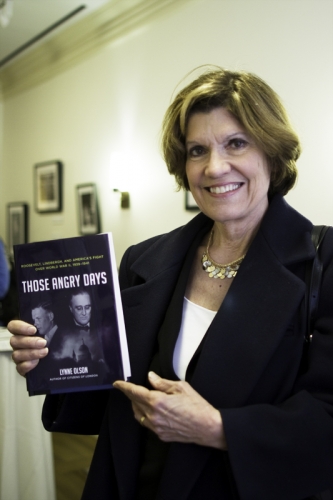

 del.icio.us
del.icio.us
 Digg
Digg